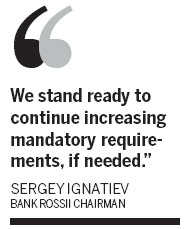Russia to rely on RRR to beat price increases
The country mops up liquidity to curb speculation and inflation
MOSCOW - Russia, the only one of the so-called BRIC countries (Brazil, Russia, India and China) without capital controls, is following China and Turkey in relying on reserve requirement ratio (RRR) to drain cash from the economy and avoid luring more speculative investment.
"We stand ready to continue increasing mandatory requirements, if needed," Bank Rossii Chairman Sergey Ignatiev said in Frankfurt on Friday. Policymakers will "act decisively to meet the forecast" for 2011 annual inflation of between 6 percent and 7 percent, he said.
The Russian central bank on Jan 31 increased the mandatory reserve ratio while unexpectedly leaving its deposit rates unchanged. Inflation in January accelerated to the fastest in 15 months.
Policymakers cited the threat of rising capital inflows driven by higher oil prices.

Emerging economies are weighing the need to curb inflation against the risk of attracting speculative capital from near-zero interest rates in the United States and Europe. The threat of a stronger rouble and stifled exports may be a "big headache" for Russia, central banker Alexei Ulyukayev said last month.
The rouble has been the best performer against the dollar in the past three months among more than 25 emerging-market currencies tracked by Bloomberg, having gained 5.06 percent.
The Russian currency gained 0.2 percent to 29.3499 for a US dollar by the close of trading in Moscow on Tuesday, a nine-month high. It reached 34.0052 against the target dollar-euro basket used by the central bank to limit swings that disadvantage exporters, the strongest since May. The basket rate is calculated by multiplying the dollar-rouble rate by 0.55, the euro-rouble rate by 0.45, and then adding them together.
Russian consumer prices in January surged 9.6 percent from a year earlier, triggered by the worst drought in at least 50 years, while monthly inflation was 2.4 percent, the quickest in two years.
Central bankers have kept the benchmark refinancing rate at a record low of 7.75 percent since June, opting to increase the deposit rate in December. Last week they raised the mandatory reserve level for liabilities to 3.5 percent for non-resident companies and 3 percent for individuals and others, both from 2.5 percent.
The policy response in countries including Turkey and Russia is "highly unorthodox" and may lead to more aggressive rate increases as inflationary expectations mount, said Maria Gordon, an emerging-market equity portfolio manager at Pacific Investment Management Co.
"I would be looking for a combination of maximum fears, when the local markets will start pricing in a large degree of tightening, and I would start taking positions on interest-rate sensitive stocks," she said in an interview in Moscow on Thursday. Traders are pricing in 0.85 percentage point of rate increases over the next three months, forward rate agreements show. Expectations on Jan 26 were the highest in more than a year, with the forwards signaling bets for 1.15 percentage points, according to data compiled by Bloomberg.
Emerging markets risk a "hard landing" as they start raising interest rates to fight inflation, Nouriel Roubini, the New York University professor who predicted the credit crisis, said at a conference in Moscow on Thursday.
China has set record-high reserve requirements, raising the level four times in about two months. South American nations from Brazil to Peru are lifting the ratios and returning to capital controls to stem a rally in their currencies.
Bank Rossii raised the reserve level for liabilities to the highest since 2008 after lowering the ratio at the height of the financial crisis that year to help lenders weather the credit squeeze. It last lifted the requirement level in August 2009.
Banks including OAO Sberbank and VTB Group, Russia's two largest lenders, may need to set aside about 100 billion roubles ($3.4 billion) to meet the new requirements, according to calculations by BNP Paribas and ZAO Raiffeisenbank.
Bloomberg News
(China Daily 02/09/2011 page17)














